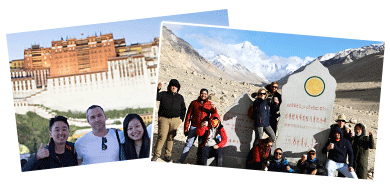
Tibet Travel Rescuers
Altitude sickness seems like the biggest concern for many travelers to Tibet. Over 4000m’s average elevation is like a formidable fortress that keeps people away. Actually, altitude sickness is not as troublesome as people always imagined. Once you are prepared, it’s not even a problem!
What is altitude sickness?
Altitude sickness - aka acute mountain sickness (AMS) is a pathological effect of high altitude on humans, caused by low partial pressure of oxygen at high altitude. It commonly occurs above 2,400 meters. It presents as a collection of nonspecific symptoms, acquired at high altitude or in low air pressure, resembling a case of “flu, carbon monoxide poisoning, or a hangover". However, most people can ascend to 2,400 meters without any problem.
What are the signs and symptoms of altitude sickness?
Headaches are the most common primary symptom used to diagnose altitude sickness. A headache occurring at an altitude above 2,400 meters combined with any one or more of the following symptoms, may be altitude sickness: lack of appetite, nausea or vomiting; fatigue or weakness; dizziness or lightheadedness; insomnia; pins and needles; shortness of breath upon exertion; nosebleed; persistent rapid pulse; drowsiness; general malaise; swelling of hands, feet and face.
How to prevent altitude sickness?
Altitude acclimatization: Altitude acclimatization is the process of adjusting to decreasing oxygen levels at higher elevations in order to avoid altitude sickness. Ascending slowly is the best way to avoid altitude sickness. You are advised not to take any strenuous activity in the first 24 hours at high altitude. Alcohol and sleeping pills are respiratory depressants, and thus slow down the acclimatization process and should be avoided. That’s also why most travel agencies won’t arrange any activities on the first day when their customers arrive in Lhasa.
Medical treatment: Some drugs like Rhodiola rosea L., also called Hong Jing Tian in Chinese traditional medicine, may help to reduce the symptoms. It can be taken before symptoms appear as a preventive measure. Some doctors will advise to take the pills days before Tibet tour in order to be prepared.
Water intake: Increased water intake may also help in acclimatization to replace to fluids lost through heavier breathing in the thin, dry air.
How to treat altitude sickness?
The reliable treatment in many cases shows the only option available is to descend to a lower elevation. Any attempts to treat or stabilize the patient in situ at high altitude is dangerous unless with professional medical skills and equipment.
Altitude sickness is a big deal especially when you are paying a visit to Tibet. However, more than 10 years’ experience in arranging various Tibet tours shows only few travelers had to cut off their Tibet journey because of altitude sickness. With little preparation and professional advice from our Tibetan guide, a safe and sound trip to Tibet even to Everest Base Camp is totally a piece of cake.

With exceptional passion and outstanding leadership, Mrs. Catherine has dedicated herself to Tibet inbound tourism and China tour for 15 years. As one of the handful females who see great potential of Chinese inbound tourism, Catherine has made great contribution to promoting Tibet tourism and enhancing the employment of Tibetans and prosperity of local Tibetan community.
Over the years, she travelled overseas with Tibet Tourism Bureau many times to promote Tibet tourism. Currently, Catherine works as the marketing director of Tibet Vista, an opinion leader behind the whole team of Tibet Vista.


.jpg)



0 Comment ON "Tibet Travel Rescuers"